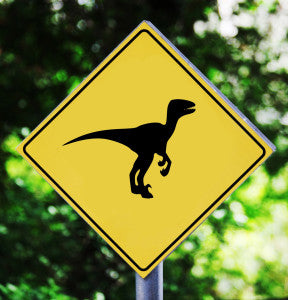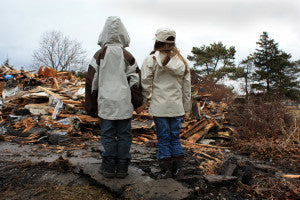By Beth Buck
[caption id="attachment_21945" align="alignright" width="288"]

Prepare for anything...including dinosaurs[/caption]
We preparedness-types like to make a goal for ourselves that we must Prepare for Anything, as though this is the ultimate goal. We've got our food storage and our kits and we've had military-standard wilderness survival training administered by former Navy SEALS. Yes! We've got it covered.
But what is “it”? What is the “anything” that we're preparing for? “Anything” is such a broad definition, it could mean a host of things that can easily drift into the realm of the absurd.
Anything. Hurricanes and earthquakes, yeah. But how about alien invasion? Godzilla attacks? Escaped velociraptors? Sentient computer games?
But in all seriousness, the whole point of emergency preparedness is twofold:
1) Have a broad plan that will cover a lot of bases.
2) Maintain a preparedness mindset.
Regarding your emergency plan: many different kinds of emergencies – the kinds that will really happen like earthquakes, chemical spills, and hurricanes – share elements in common that can be anticipated. These elements include but are not limited to: loss of electricity, water, and other utilities; issues with communication; inability of emergency medical personnel to reach the people who need them most; closed roads; grocery stores with empty shelves. An emergency plan that can account for the above is a good place to start.
Being prepared for anything does not mean the same as being prepared for
everything, but lucky for all of us, you don't need to worry about
everything. The Rocky Mountains are pretty well land-locked, so it's pretty unlikely that we'll see anything the likes of Hurricane Katrina in my neck of the woods, or a tsunami, say. But I have lived on a fault line for the last sixteen years. In all of that time, the Powers That Be have been consistent in their advice to prepare for a large-scale earthquake. They've been saying that for sixteen years and we haven't gotten one yet. All the more reason to be prepared: I've had sixteen years to get my rear end in gear!

Even though most natural or man-made disasters share those common elements, no two disasters are the same. Preparing for one disaster isn't going to look like preparing for any other eventuality. Take hurricanes vs. earthquakes, for example. Thanks to modern methods of weather tracking we know several days in advance whether any given hurricane will make landfall and where. America's infrastructure can in many cases accommodate city-wide evacuations in regions most at risk for hurricane damage. An earthquake isn't the same at all; they can hit anytime, anywhere, with absolutely no warning. And when that happens, you want to have your preparedness mindset fully engaged.
No two disasters are completely the same, even as no two hurricanes or earthquakes or chemical spills are the same. Even with today's technology, it is not possible to know exactly what you're facing in any given situation, and even with the most detailed evacuation plan, unanticipated things will come up. How you deal with that unanticipated trouble is the essence of preparing for anything.
Are you the kind of person who, when a wrench gets thrown full-on into the face of our plans, will give up? Or do you want to be the kind of person who will instead do some quick thinking to problem-solve your way out of the predicament? Because if you don't have the right tool for the right job, that is what you will have to do. Developing that proper mindset is easier said than done; it comes naturally to some people while others have to work at it.
Luckily, mindset isn't the end-all and be-all of being prepared. In conjunction with a broad emergency preparedness plan, you can be ready for anything.
 Beth Buck has been involved with emergency preparedness since her very earliest years. She enjoys hiking, martial arts, reading, and writing about food storage. Beth lives in the Intermountain West with her family.
Beth Buck has been involved with emergency preparedness since her very earliest years. She enjoys hiking, martial arts, reading, and writing about food storage. Beth lives in the Intermountain West with her family.

 Prepare for anything...including dinosaurs[/caption]
We preparedness-types like to make a goal for ourselves that we must Prepare for Anything, as though this is the ultimate goal. We've got our food storage and our kits and we've had military-standard wilderness survival training administered by former Navy SEALS. Yes! We've got it covered.
But what is “it”? What is the “anything” that we're preparing for? “Anything” is such a broad definition, it could mean a host of things that can easily drift into the realm of the absurd. Anything. Hurricanes and earthquakes, yeah. But how about alien invasion? Godzilla attacks? Escaped velociraptors? Sentient computer games?
But in all seriousness, the whole point of emergency preparedness is twofold:
1) Have a broad plan that will cover a lot of bases.
2) Maintain a preparedness mindset.
Regarding your emergency plan: many different kinds of emergencies – the kinds that will really happen like earthquakes, chemical spills, and hurricanes – share elements in common that can be anticipated. These elements include but are not limited to: loss of electricity, water, and other utilities; issues with communication; inability of emergency medical personnel to reach the people who need them most; closed roads; grocery stores with empty shelves. An emergency plan that can account for the above is a good place to start.
Being prepared for anything does not mean the same as being prepared for everything, but lucky for all of us, you don't need to worry about everything. The Rocky Mountains are pretty well land-locked, so it's pretty unlikely that we'll see anything the likes of Hurricane Katrina in my neck of the woods, or a tsunami, say. But I have lived on a fault line for the last sixteen years. In all of that time, the Powers That Be have been consistent in their advice to prepare for a large-scale earthquake. They've been saying that for sixteen years and we haven't gotten one yet. All the more reason to be prepared: I've had sixteen years to get my rear end in gear!
Prepare for anything...including dinosaurs[/caption]
We preparedness-types like to make a goal for ourselves that we must Prepare for Anything, as though this is the ultimate goal. We've got our food storage and our kits and we've had military-standard wilderness survival training administered by former Navy SEALS. Yes! We've got it covered.
But what is “it”? What is the “anything” that we're preparing for? “Anything” is such a broad definition, it could mean a host of things that can easily drift into the realm of the absurd. Anything. Hurricanes and earthquakes, yeah. But how about alien invasion? Godzilla attacks? Escaped velociraptors? Sentient computer games?
But in all seriousness, the whole point of emergency preparedness is twofold:
1) Have a broad plan that will cover a lot of bases.
2) Maintain a preparedness mindset.
Regarding your emergency plan: many different kinds of emergencies – the kinds that will really happen like earthquakes, chemical spills, and hurricanes – share elements in common that can be anticipated. These elements include but are not limited to: loss of electricity, water, and other utilities; issues with communication; inability of emergency medical personnel to reach the people who need them most; closed roads; grocery stores with empty shelves. An emergency plan that can account for the above is a good place to start.
Being prepared for anything does not mean the same as being prepared for everything, but lucky for all of us, you don't need to worry about everything. The Rocky Mountains are pretty well land-locked, so it's pretty unlikely that we'll see anything the likes of Hurricane Katrina in my neck of the woods, or a tsunami, say. But I have lived on a fault line for the last sixteen years. In all of that time, the Powers That Be have been consistent in their advice to prepare for a large-scale earthquake. They've been saying that for sixteen years and we haven't gotten one yet. All the more reason to be prepared: I've had sixteen years to get my rear end in gear!
 Even though most natural or man-made disasters share those common elements, no two disasters are the same. Preparing for one disaster isn't going to look like preparing for any other eventuality. Take hurricanes vs. earthquakes, for example. Thanks to modern methods of weather tracking we know several days in advance whether any given hurricane will make landfall and where. America's infrastructure can in many cases accommodate city-wide evacuations in regions most at risk for hurricane damage. An earthquake isn't the same at all; they can hit anytime, anywhere, with absolutely no warning. And when that happens, you want to have your preparedness mindset fully engaged.
No two disasters are completely the same, even as no two hurricanes or earthquakes or chemical spills are the same. Even with today's technology, it is not possible to know exactly what you're facing in any given situation, and even with the most detailed evacuation plan, unanticipated things will come up. How you deal with that unanticipated trouble is the essence of preparing for anything.
Are you the kind of person who, when a wrench gets thrown full-on into the face of our plans, will give up? Or do you want to be the kind of person who will instead do some quick thinking to problem-solve your way out of the predicament? Because if you don't have the right tool for the right job, that is what you will have to do. Developing that proper mindset is easier said than done; it comes naturally to some people while others have to work at it.
Luckily, mindset isn't the end-all and be-all of being prepared. In conjunction with a broad emergency preparedness plan, you can be ready for anything.
Even though most natural or man-made disasters share those common elements, no two disasters are the same. Preparing for one disaster isn't going to look like preparing for any other eventuality. Take hurricanes vs. earthquakes, for example. Thanks to modern methods of weather tracking we know several days in advance whether any given hurricane will make landfall and where. America's infrastructure can in many cases accommodate city-wide evacuations in regions most at risk for hurricane damage. An earthquake isn't the same at all; they can hit anytime, anywhere, with absolutely no warning. And when that happens, you want to have your preparedness mindset fully engaged.
No two disasters are completely the same, even as no two hurricanes or earthquakes or chemical spills are the same. Even with today's technology, it is not possible to know exactly what you're facing in any given situation, and even with the most detailed evacuation plan, unanticipated things will come up. How you deal with that unanticipated trouble is the essence of preparing for anything.
Are you the kind of person who, when a wrench gets thrown full-on into the face of our plans, will give up? Or do you want to be the kind of person who will instead do some quick thinking to problem-solve your way out of the predicament? Because if you don't have the right tool for the right job, that is what you will have to do. Developing that proper mindset is easier said than done; it comes naturally to some people while others have to work at it.
Luckily, mindset isn't the end-all and be-all of being prepared. In conjunction with a broad emergency preparedness plan, you can be ready for anything.
 Beth Buck has been involved with emergency preparedness since her very earliest years. She enjoys hiking, martial arts, reading, and writing about food storage. Beth lives in the Intermountain West with her family.
Beth Buck has been involved with emergency preparedness since her very earliest years. She enjoys hiking, martial arts, reading, and writing about food storage. Beth lives in the Intermountain West with her family.


